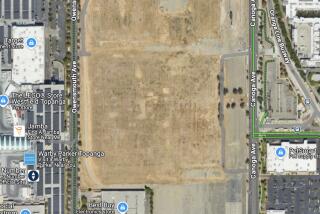NRC Team Says Spill Not Harmful : Accident: Radioactive material was tracked to other parts of VA Hospital on shoes of employees.
- Share via
Nuclear Regulatory Commission investigators left town Sunday, confident that radioactive material spilled last week at a La Jolla hospital research lab did not endanger the health of patients or 11 workers who may have come in contact with the powdery substance.
Spokesman Greg Cook said, however, that researchers in the hematology-oncology lab at the Veterans Administration Medical Center would be restricted from working with any radioactive materials until the hospital completes its investigation into the incident involving the radioactive isotope phosphorus-32.
“The hospital said the workers weren’t going to be using any radioactive materials until they got to the bottom of the reasons for the spill,” said Cook, who arrived Friday with four NRC investigators from the agency’s Walnut Creek regional headquarters. “And we’re going to be watching them to see what happens.”
Gayle Gray, a spokesman for the VA Hospital, confirmed that the lab workers at the La Jolla Village Drive facility would be restricted from continuing their work with the radioactive material.
Authorities say phosphorus-32 isotope--used as a tracer agent in laboratory cell research--was apparently spilled sometime last week by workers in a sixth-floor research wing. The substance was then tracked into an adjacent hallway and elevator after cleanup efforts failed to remove all traces of the isotope. The spill was discovered by hospital administrators on Friday.
“These kinds of spills aren’t that unusual,” Cook said. “What is unusual is that the workers didn’t get it all cleaned up. And what’s more unusual is that the substance got tracked into a public area of the hospital.”
Radioactive surveys of the homes of the 11 lab workers Saturday revealed small traces of the isotope on two pairs of shoes belonging to two different workers, but the substance was not present in a large enough amount to be hazardous, Cook said.
Surveys at the hospital also proved negative for harmful amounts of the substance. “There were two minor spots, one in an elevator,” Cook said. “But we believe the hospital when they say they have the situation under control.”
Next week, the hospital will also conduct exams to monitor the body fluids in several of the lab workers, Cook said.
The federal regulatory agency could take a number of actions against the hospital--including a revocation of the facility’s permit to use radioactive materials--if it finds that improper procedures or lax safety standards were in use there.
“We’re going to do our part looking into things,” Cook said. “And the hospital assures us that a full-scale investigation is going to be conducted to see if inadequate training was the problem or faulty procedures.”
The inquest, he said, could take several weeks.
More to Read
Sign up for Essential California
The most important California stories and recommendations in your inbox every morning.
You may occasionally receive promotional content from the Los Angeles Times.














